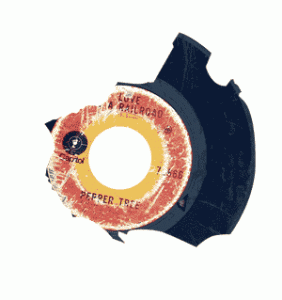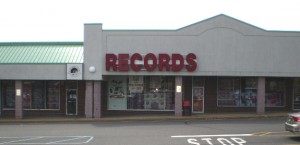 It is a muggy, overcast summer day, the kind of unsettled New Jersey weather that precludes long distance trips. Once, these were the kinds of days local shop owners dreamed of, especially shops that focused on youth-oriented products like music. However, with the advent of downloadable music via iTunes and Amazon, these stores have lost much ground and revenue from consumers.
It is a muggy, overcast summer day, the kind of unsettled New Jersey weather that precludes long distance trips. Once, these were the kinds of days local shop owners dreamed of, especially shops that focused on youth-oriented products like music. However, with the advent of downloadable music via iTunes and Amazon, these stores have lost much ground and revenue from consumers.
It can be seen in so many local music stores, such as one I recently visited. The exterior is clean and uncluttered. Inside, Bob Marley is being played over the sound system, the week’s new releases are well represented, the interior lighting is bright and the dÁ©cor pops with color, but there are no patrons. When asked how business has been lately, the employee (who declined to provide a name) replied with serious candor, ”Pretty bad.”
For more than a decade, music stores nationwide have been suffering consumer attrition because of a radical shift in the culture itself where, thanks to technology, a world of music is always just a click away. Yet there are lessons to be learned from these hard times as other media formats are quickly coming to know.
According to The New York Times in an article from mid-July, Amazon’s e-book sales have surpassed hardcover sales and are on-track to do the same with soft cover books in only a matter of months. The conventional wisdom believed that no matter how popular the Kindle, iPad and other reader units became, they would be the preferred mode for gadget fans solely while the printed book held tight. This assumption is steadily being challenged.
Meanwhile, Blockbuster inches inexorably toward bankruptcy while newcomers RedBox and Netflix gobble up market share. Netflix in particular has the upper hand after introducing videos that can be streamed directly from their site, then sent from a computer to any HDTV with HDMI cable capacity, bypassing physical DVDs altogether. While the music store saga has been going on for years, their story is a case study revealing where most entertainment media will be heading.
Even so, some music stores are doggedly bucking the trend, but the seeds of their survival have much to do with their earliest business practices than their latter ones.
The Customer Base – Writers and avid music fans Cris Slotoroff and John Arthur believe there is hope for music stores and the downward trajectory of physical media is partly the fault of some shop owners. ”I think there are more positives than negatives, but major labels, chain stores, and reluctant mom and pop stores will tell you it’s a dying industry because they are unwilling to adapt” says Slotoroff.
Arthur is more matter-of-fact about digital media. ”The trend toward digital does not seem problematic to me, because the format does not matter much if one is not an audiophile. The trend toward rampant illegal downloading does bother me. Although copyright laws are sometimes taken too far, especially when labels are profiting from artists who aren’t even alive any more and not allowing people to build on older works in a collaborative way, these laws exist to protect the intellectual property of the artist.”
Arthur’s appreciation of physical media hangs on the additional features a download seldom provides. ”My main reason for buying music is to have the album artwork, liner notes, and whatever else information is made available with the physical copy of the album. I also like to have a back-up — with CDs I will put them onto iTunes and load them onto my iPod, but I also like to have the discs themselves in case I ever have to reload them, or if my iPod is out of batteries, broken, or missing.”
Slotoroff agrees that, for the music fan, the music is only a part of the package. ”I like that the music is only one facet of a band’s work – artwork, lyrics, listed influences, and something physical to hold in your hands really makes music memorable. You remember buying it, the whole experience hopefully. You really connect with a band when you have the entire fruit of their efforts in your hands, and by you actually going someplace to get it, it sort of completes the circle.”
On the opposite side of the argument, Larry Laster, 35, has given up physical media almost entirely. ”Those I do purchase it’s usually for one of a few reasons, so I can hand the artist my cash, and have them hand me the disc at a show (I like to do this, especially for indie artists or people I know,) it’s an artist I am a long time fan of, own the entire discography of, and want to own newer releases, completest that I am, or there is some very cool pre-order deal for a new release.”
When asked why downloading is preferred, Laster is pragmatic. ”I realized it just makes more sense for me, since even if I buy the physical CD, I immediately convert it to mp3 format, and listen on an mp3 player, or directly from my PC.” The new means by which he gets and listens to music hasn’t changed the experience for him either. ”It’s pretty much the same for me. I almost never play on shuffle, beyond shuffling within an artist’s catalog. I also did this before with a CD changer, so I still hear the album beginning to end, and often listen to it over and over.”
 History Is A Factor – From a sampling of various music shops comes the realization that, just as important as seeing the trends of the times and adjusting to them, an establishment has to pay their dues and build a steady customer base.
History Is A Factor – From a sampling of various music shops comes the realization that, just as important as seeing the trends of the times and adjusting to them, an establishment has to pay their dues and build a steady customer base.
Considered one of the largest, and most successful of the state’s music stores, Vintage Vinyl located off Rt. 1 in Fords, New Jersey offers new music as well as used CDs and vinyl. They have a large selection of DVDs as well, veering toward cult hits and niche titles, but it is the loyalty of the clientele over the years that is the store’s biggest asset. A quick survey of several of the customers reveals time and again that they have been shopping at the location through the highs and lows of the music industry.
History is cited as an asset by Jonathan Lambert, general manager of Princeton Record Exchange, but not their most important one. When asked if being the only committed media outlet within walking distance of the Princeton University campus is a plus, he quickly refutes the assumption. ”University students as a whole do not shop in our store that much. They’re in the 18-to-21 year old group, they get free file sharing with their tuition.”
The draw to Princeton Record Exchange comes from a refocusing on their stock of used CDs which has offset the precipitous fall of new CD sales. ”Being in a tourist town with high foot traffic has helped us tremendously.” The store is celebrating its thirtieth anniversary in Princeton and that history, along with recognizing change and moving with it has benefited them. ”If you have a bad paradigm and you try to stay around for years – Tower Records, Sam Goody’s, certainly they were around a lot longer than we are, but they’re gone.”
”You have to react to the times, not cling to outdated or outmoded concepts of what should work, but rather adapt to what is working and try to go with your strengths,” Lambert concluded.
 While the smaller stores look to cinch up specialty niches that will make them stand out, big box chains like Best Buy, Target and Wal-Mart have attempted to change the game entirely by becoming the sole outlet for some new releases. Wal-Mart touted exclusive comebacks from Journey, Foreigner and Kiss while Best Buy cast their lot with the long awaited Chinese Democracy from Guns N’ Roses, a release that was met with critical and consumer indifference. At the same time, all these stores have reduced the footprint of their music departments, keeping the viable square footage down to only the necessary minimum.
While the smaller stores look to cinch up specialty niches that will make them stand out, big box chains like Best Buy, Target and Wal-Mart have attempted to change the game entirely by becoming the sole outlet for some new releases. Wal-Mart touted exclusive comebacks from Journey, Foreigner and Kiss while Best Buy cast their lot with the long awaited Chinese Democracy from Guns N’ Roses, a release that was met with critical and consumer indifference. At the same time, all these stores have reduced the footprint of their music departments, keeping the viable square footage down to only the necessary minimum.
The Cost Of Free – The music industry’s biggest drain is not a lack of interest in the product, as pop culture makes superstars out of artists like Katy Perry, Justin Bieber and Lady Gaga, creating fan fervor that equals anything seen in recent music history. Yet that interest isn’t always translating into sales, factoring in the many ways that internet piracy enables theft. According to a New York Times article from January, the International Federation of the Phonographic Industry claims 95% of music downloaded from the internet is from illegal sources outside of sales portals like iTunes and Amazon.Com.
The most notorious example of the illegal download mindset came in 2007 when the band Radiohead initially released their album In Rainbows digitally through their site. Their pricing scheme was simply that the consumer registered with the site, chose the price they felt like paying and entered it, then received the file at that price. If they felt inclined to enter $0.00, they received their download for free. And yet, according to Forbes.Com, portals of that time like The Pirate Bay and TorrentSpy racked up major hits, downloading that same file, at the same marginal-quality bitrate, also for free. The conclusion became that, even if the free status is comparable between the legal and illegal venues, the habit of the illegal version has become the standard model for music consumers, a red-flag for artists, labels and media shops alike.
In July, funk-rock icon Prince decided to go entirely against the tide by shutting down his web presence and announcing his latest album, 20Ten, would be released as a giveaway through newspapers in Europe. There would be no official digital provider, not even iTunes. His assertion that ”the Internet’s completely over” was betrayed by the reality of music piracy, and 20Ten found itself available digitally, worldwide, on the day and date of its anachronistically analog release, but as a heavily trafficked illegal version.
This is not a new story for stores like the one I mentioned earlier. For them, and the many businesses still in operation, it is a day-by-day process, making sure the atmosphere and the stock are prepared for customers who may or may not be there to greet them. For them, the cost of free’ to consumers who still want the latest hits without paying for them is a very high price being paid by storefront retailers.




Comments